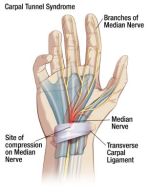- Home
- Work injuries
- Carpal Tunnel Syndrome Statistics
Carpal tunnel syndrome
statistics
Latest carpal tunnel syndrome statistics
Incidences higher in other work
By Ellen Simon (AP)
With the personal computing boom of the 1990s came thousands of "repetitive stress injuries" or "repetitive strain injuries."
RSI became the hip medical acronym of the keyboard era, with subset carpal tunnel syndrome the diagnosis of the day.
"At its height of diagnosis, anybody showing up at a doctor's office with wrist pain or hand pain was being diagnosed with carpal tunnel," said Carol Harnett, vice president of insurer Hartford Financial Services Group Inc.'s group benefits division.
Since then, carpal tunnel cases have plummeted, declining 21 percent in 2006 alone, according to the Bureau of Labor Statistics.
Among workers in professional and business services, the number of carpal tunnel syndrome cases fell by half between 2005 and 2006.
What changed?
First, it may not have been the white-collar epidemic it appeared to be.
A 2001 study by the Mayo Clinic found heavy computer users (up to seven hours a day) had the same rate of carpal tunnel as the general population.
Harvard University headlined a 2005 press release "Computer use deleted as carpal tunnel syndrome cause."
"Clearly, if keyboarding activities were a significant risk for carpal tunnel, we should have seen, over the last 10 to 15 years, an explosion of cases," said Dr. Kurt Hegmann, director of the Rocky Mountain Center for Occupational & Environmental Health.
"If keyboarding were a risk, it cannot be a strong factor."
Cases overdiagnosed
Blue-collar workers, especially those doing assembly-line work such as sewing, cleaning and meat or poultry packing, have a far greater incidence of carpal tunnel than white-collar workers, according to Bureau of Labor Statistics data.
That doesn't mean white-collar workers don't get carpal tunnel and related disorders.
But it may mean such disorders were overdiagnosed when they were most in the news, resulting in an artificially high number of cases by the late 1990s.
Most doctors have dropped the term RSI, calling them "musculoskeletal disorders," while government agencies prefer "cumulative trauma disorders."
Other theories arise
Now, some experts think some of those patients had "referred pain" from trouble elsewhere, such as the neck.
Other theories claim attention to ergonomics has prevented injuries or that they have become underreported because they lack the immediacy of a broken bone.
At the height of RSI fever, it was hard to avoid.
The National Institute for Occupational Safety and Health received three times as many requests for health and hazard evaluations related to wrist pain in 1992 than it did in 1982. During 1998, an estimated three of every 10,000 workers lost time from work because of carpal tunnel syndrome, according to the National Institutes of Health.
People who have had a cumulative trauma disorder say it can be debilitating.
Clay Scott, an assistant professor of electrical engineering and computer science at the University of Michigan, developed severe wrist pain while attending Harvard University. By the end of his senior year, he said he was incapable of doing daily tasks such as cutting food and opening doors.
His recovery started with physical therapy a few times a week and a home exercise program to stretch and strengthen his back and neck muscles.
It took three or four years for him to recover, he said. "I was hurting myself for about two years before figuring it out and realizing I needed to change my work habits," he said.
Some businesses have been focusing on prevention as part of a growing effort by employers to keep their workers healthy.
BlueCross BlueShield of Kansas started a program in 1991, when costs of the injuries to its employees passed $500,000.
It bought ergonomic chairs and desks, introduced ergonomic assessments for new employees during their first two weeks of work and hired two full-time registered nurses to work with employees.
Since the program started, the company's workers' compensation costs have fallen by 62 percent, said Terri Janda, a nurse who leads the BlueCross program.
Check out another great article regarding
carpal tunnel syndrome statistics ...titled "Is CTS caused by work?"
For work comp info See
Florida Work Comp Law Work Comp Claim Laws
Carpal tunnel causes
Carpal tunnel wrist braces
Carpal tunnel treatments
- Home
- Work injuries
- Carpal Tunnel Syndrome Statistics
Share this page:
Recent Articles
-
The carpal tunnel store
The carpal tunnel store has a huge selection of Medical Grade Products -
Anatomy of the carpal tunnel
The carpal tunnel anatomy is easy to understand if you remember we're dealing with a tunnel of sorts in your wrist. Learn the anatomy from a medical practitioner. -
Carpal tunnel prevention program
A carpal tunnel prevention program at the workplace may help employees from getting symptoms. Learn the best carpal tunnel prevention program on the web today.
Recent Articles
-
The carpal tunnel store
The carpal tunnel store has a huge selection of Medical Grade Products -
Anatomy of the carpal tunnel
The carpal tunnel anatomy is easy to understand if you remember we're dealing with a tunnel of sorts in your wrist. Learn the anatomy from a medical practitioner. -
Carpal tunnel prevention program
A carpal tunnel prevention program at the workplace may help employees from getting symptoms. Learn the best carpal tunnel prevention program on the web today.
